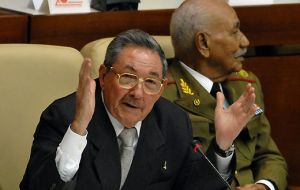MercoPress. South Atlantic News Agency
Catholic Church/Castro regime accord releases 32 political prisoners
 Cuban president Raúl Castro
Cuban president Raúl Castro Cuba's Roman Catholic Church revealed Tuesday the names of six more political prisoners to be released into exile in Spain under an agreement with President Raul Castro's government, bringing the total to 32 so far.
The men are among 75 dissidents who were arrested in a March 2003 crackdown on organized political opposition and sentenced to lengthy prison terms on charges that included treason. In a landmark deal, Cuba agreed on July 7 to release the remaining 52 prisoners still jailed from the crackdown.
Church official Orlando Marquez said in a statement that the next six slated for release are Victor Arroyo Carmona, Alexis Rodriguez Fernandez, Leonel Grave de Peralta Almenares, Alfredo Dominguez Batista, Prospero Gainza Aguero and Claro Sanchez Altarriba.
Both the Cuban government and the church say releasing all 52 will take months — but Tuesday's announcement means that after barely six weeks, just 20 are still left behind bars.
Earlier the Church pointed out that its effort to mediate the release of political prisoners was and will be motivated by human dignity, not ideological tendencies of any sort.
This clarification came in response to an open letter sent by a group of dissidents to Benedict XVI.
The letter criticized the Church's strategy, specifically in accepting the released prisoners' transfer to Spain. The released prisoners are not satisfied with the exiled status granted by Spain that limits their political activities in support for freedom and human rights in Cuba.
A statement posted over a week ago from the spokesman of the Archdiocese of Havana noted that the Church anticipated from the beginning varied responses to its mediation: “from insults and defamation to acceptance and gratitude.”
But, Orlando Márquez Hidalgo continued, “To remain inactive was not a valid option for the Church because of its pastoral mission.”
The statement assured that the effort “has not been based nor will it ever be based on political tendencies, neither those of the government nor those of the people who oppose it, but rather in its pastoral mission.”
The spokesman affirmed that the Pope is very well aware of this motivation. In this regard, he pointed to July statements from the Vatican spokesman, Jesuit Father Federico Lombardi.
Reflecting on the mediation efforts, the Jesuit affirmed that the Church in Cuba “bears sufferings and hopes with dignity and with patience, without servility but also without trying to increase tensions.”
Father Lombardi affirmed the Church makes a “continuous effort to open roads to understanding and to dialogue” and hopes “that the journey will continue”.




Top Comments
Disclaimer & comment rules-

Read all commentsCuba, has suffered for many years under the Castro administration. The island nation, would have been much better off if Cuba had freedom instead of Castro's damaging dictatorship.
Aug 27th, 2010 - 12:47 am 0Commenting for this story is now closed.
If you have a Facebook account, become a fan and comment on our Facebook Page!